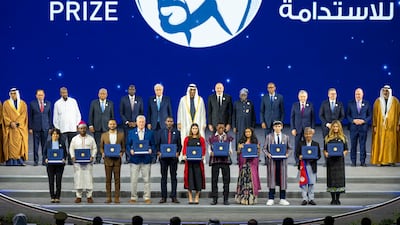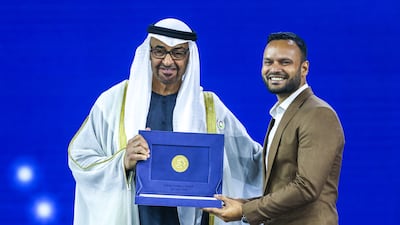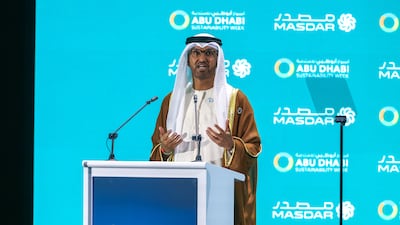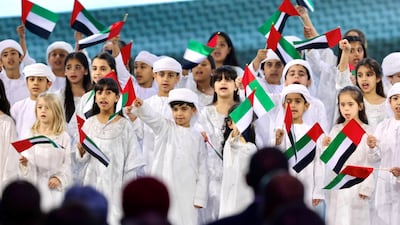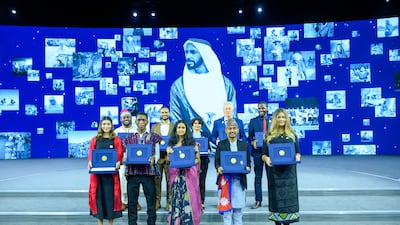An annual UAE environmental award offering support to organisations leading the fight against climate change has issued a global call for submissions for its 2026 prize.
The Zayed Sustainability Prize, named after UAE Founding Father, the late Sheikh Zayed bin Sultan Al Nahyan, honours the critical work of small and medium enterprises, non-profit organisations and high schools seeking to transform lives around the world.
The $5.9 million prize pool is shared between the winners in six categories – health, food, energy, water, climate action and global high schools. Winners of five themed categories stand to win $1 million, while those in the global high schools category, which is divided into six world regions, can claim up to $150,000 to boost their projects.
To encourage a wider variety of organisations and high schools to participate, submissions will be accepted in several languages, including Arabic, Chinese, English, French, Russian, Spanish and Portuguese.
To date, the prize, operated under Erth Zayed Philanthropies, has affected 400 million people worldwide.
“The Zayed Sustainability Prize honours Sheikh Zayed’s vision of advancing inclusive sustainable and humanitarian development. By supporting projects that harness new technologies to improve lives and drive prosperity in local communities, the Prize places people at the heart of progress, and demonstrates the role of the Nexus of Next in accelerating socio-economic growth worldwide," said Dr Sultan Al Jaber, Minister of Industry and Advanced Technology and director general of the Zayed Sustainability Prize.
Applications can be made on the prize's website.
2025 winners
The most recent prize winners were recognised at an awards ceremony in Abu Dhabi in the presence of President Sheikh Mohamed, as well as 11 heads of state and several ministers and business leaders.
India’s Periwinkle Technologies won the health category for its portable, AI-enabled cervical cancer screening device. It operates without electricity and provides results within 30 seconds.
In the food category, Nigeria’s NaFarm Foods won for its hybrid solar food dryers that prevent post-harvest losses. Australia's SkyJuice Foundation, meanwhile, picked up the award in the water category for its gravity-powered water treatment system, which uses low-pressure membrane filters to provide clean drinking water without the need for chemicals, pumps or external energy sources.
In the climate action category, OpenMap Development Tanzania won for its innovative mapping, which merges community-driven data collection with advanced technology including drones, geographic information systems and remote sensing.
Zayed Sustainability Awards 2025 - in pictures
Emergency phone numbers in the UAE
Estijaba – 8001717 – number to call to request coronavirus testing
Ministry of Health and Prevention – 80011111
Dubai Health Authority – 800342 – The number to book a free video or voice consultation with a doctor or connect to a local health centre
Emirates airline – 600555555
Etihad Airways – 600555666
Ambulance – 998
Knowledge and Human Development Authority – 8005432 ext. 4 for Covid-19 queries
Who are the Sacklers?
The Sackler family is a transatlantic dynasty that owns Purdue Pharma, which manufactures and markets OxyContin, one of the drugs at the centre of America's opioids crisis. The family is well known for their generous philanthropy towards the world's top cultural institutions, including Guggenheim Museum, the National Portrait Gallery, Tate in Britain, Yale University and the Serpentine Gallery, to name a few. Two branches of the family control Purdue Pharma.
Isaac Sackler and Sophie Greenberg were Jewish immigrants who arrived in New York before the First World War. They had three sons. The first, Arthur, died before OxyContin was invented. The second, Mortimer, who died aged 93 in 2010, was a former chief executive of Purdue Pharma. The third, Raymond, died aged 97 in 2017 and was also a former chief executive of Purdue Pharma.
It was Arthur, a psychiatrist and pharmaceutical marketeer, who started the family business dynasty. He and his brothers bought a small company called Purdue Frederick; among their first products were laxatives and prescription earwax remover.
Arthur's branch of the family has not been involved in Purdue for many years and his daughter, Elizabeth, has spoken out against it, saying the company's role in America's drugs crisis is "morally abhorrent".
The lawsuits that were brought by the attorneys general of New York and Massachussetts named eight Sacklers. This includes Kathe, Mortimer, Richard, Jonathan and Ilene Sackler Lefcourt, who are all the children of either Mortimer or Raymond. Then there's Theresa Sackler, who is Mortimer senior's widow; Beverly, Raymond's widow; and David Sackler, Raymond's grandson.
Members of the Sackler family are rarely seen in public.
Bert van Marwijk factfile
Born: May 19 1952
Place of birth: Deventer, Netherlands
Playing position: Midfielder
Teams managed:
1998-2000 Fortuna Sittard
2000-2004 Feyenoord
2004-2006 Borussia Dortmund
2007-2008 Feyenoord
2008-2012 Netherlands
2013-2014 Hamburg
2015-2017 Saudi Arabia
2018 Australia
Major honours (manager):
2001/02 Uefa Cup, Feyenoord
2007/08 KNVB Cup, Feyenoord
World Cup runner-up, Netherlands
The five pillars of Islam
EA Sports FC 26
Publisher: EA Sports
Consoles: PC, PlayStation 4/5, Xbox Series X/S
Rating: 3/5
More from Neighbourhood Watch:
More on Quran memorisation:
UAE currency: the story behind the money in your pockets
The Sand Castle
Director: Matty Brown
Stars: Nadine Labaki, Ziad Bakri, Zain Al Rafeea, Riman Al Rafeea
Rating: 2.5/5
Fixtures
50-over match
UAE v Lancashire, starts at 10am
Champion County match
MCC v Surrey, four-day match, starting on Sunday, March 24, play starts at 10am
Both matches are at ICC Academy, Dubai Sports City. Admission is free.
GAC GS8 Specs
Engine: 2.0-litre 4cyl turbo
Power: 248hp at 5,200rpm
Torque: 400Nm at 1,750-4,000rpm
Transmission: 8-speed auto
Fuel consumption: 9.1L/100km
On sale: Now
Price: From Dh149,900
What it means to be a conservationist
Who is Enric Sala?
Enric Sala is an expert on marine conservation and is currently the National Geographic Society's Explorer-in-Residence. His love of the sea started with his childhood in Spain, inspired by the example of the legendary diver Jacques Cousteau. He has been a university professor of Oceanography in the US, as well as working at the Spanish National Council for Scientific Research and is a member of the World Economic Forum’s Global Future Council on Biodiversity and the Bio-Economy. He has dedicated his life to protecting life in the oceans. Enric describes himself as a flexitarian who only eats meat occasionally.
What is biodiversity?
According to the United Nations Environment Programme, all life on earth – including in its forests and oceans – forms a “rich tapestry of interconnecting and interdependent forces”. Biodiversity on earth today is the product of four billion years of evolution and consists of many millions of distinct biological species. The term ‘biodiversity’ is relatively new, popularised since the 1980s and coinciding with an understanding of the growing threats to the natural world including habitat loss, pollution and climate change. The loss of biodiversity itself is dangerous because it contributes to clean, consistent water flows, food security, protection from floods and storms and a stable climate. The natural world can be an ally in combating global climate change but to do so it must be protected. Nations are working to achieve this, including setting targets to be reached by 2020 for the protection of the natural state of 17 per cent of the land and 10 per cent of the oceans. However, these are well short of what is needed, according to experts, with half the land needed to be in a natural state to help avert disaster.
New Zealand 21 British & Irish Lions 24
New Zealand
Penalties: Barrett (7)
British & Irish Lions
Tries: Faletau, Murray
Penalties: Farrell (4)
Conversions: Farrell
Conflict, drought, famine
Estimates of the number of deaths caused by the famine range from 400,000 to 1 million, according to a document prepared for the UK House of Lords in 2024.
It has been claimed that the policies of the Ethiopian government, which took control after deposing Emperor Haile Selassie in a military-led revolution in 1974, contributed to the scale of the famine.
Dr Miriam Bradley, senior lecturer in humanitarian studies at the University of Manchester, has argued that, by the early 1980s, “several government policies combined to cause, rather than prevent, a famine which lasted from 1983 to 1985. Mengistu’s government imposed Stalinist-model agricultural policies involving forced collectivisation and villagisation [relocation of communities into planned villages].
The West became aware of the catastrophe through a series of BBC News reports by journalist Michael Buerk in October 1984 describing a “biblical famine” and containing graphic images of thousands of people, including children, facing starvation.
Band Aid
Bob Geldof, singer with the Irish rock group The Boomtown Rats, formed Band Aid in response to the horrific images shown in the news broadcasts.
With Midge Ure of the band Ultravox, he wrote the hit charity single Do They Know it’s Christmas in December 1984, featuring a string of high-profile musicians.
Following the single’s success, the idea to stage a rock concert evolved.
Live Aid was a series of simultaneous concerts that took place at Wembley Stadium in London, John F Kennedy Stadium in Philadelphia, the US, and at various other venues across the world.
The combined event was broadcast to an estimated worldwide audience of 1.5 billion.
The specs
Engine: 4.0-litre V8 twin-turbocharged and three electric motors
Power: Combined output 920hp
Torque: 730Nm at 4,000-7,000rpm
Transmission: 8-speed dual-clutch automatic
Fuel consumption: 11.2L/100km
On sale: Now, deliveries expected later in 2025
Price: expected to start at Dh1,432,000
Libya's Gold
UN Panel of Experts found regime secretly sold a fifth of the country's gold reserves.
The panel’s 2017 report followed a trail to West Africa where large sums of cash and gold were hidden by Abdullah Al Senussi, Qaddafi’s former intelligence chief, in 2011.
Cases filled with cash that was said to amount to $560m in 100 dollar notes, that was kept by a group of Libyans in Ouagadougou, Burkina Faso.
A second stash was said to have been held in Accra, Ghana, inside boxes at the local offices of an international human rights organisation based in France.
